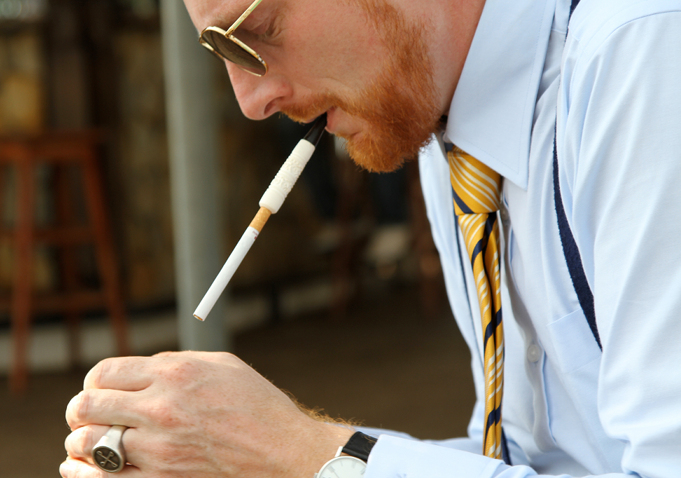 Mads Brugger is a man with a death wish.
Mads Brugger is a man with a death wish.
The Danish journalist turned filmmaker will turn a lot of heads with “The Ambassador,” which recently debuted at the New Directors/New Films program in New York City. The film is ostensibly a documentary about the corruption between Central African despots and the foreign consulates that humor them, through the exchange of money, goods, and most importantly, conflict diamonds. Given such a volatile subject, Brugger could have kept his distance, investigating from afar, but he knew that wouldn’t get him the answers he craved. And so he put on an ice cream suit, picked up smoking, and became the mysterious Mister Cortzen.
It’s this delicious moral maze that gives “The Ambassador” a sticky, anarchic kick. As Cortzen, Brugger makes arrangements to become the Liberian consul, first by linking up with a questionable website and, soon, major political officials. No one Cortzen encounters has any illusions about what’s going on here — he seeks diplomatic freedom to travel from Europe to the Central African Republic (CAR), where his cover will be designing a sketchy-sounding matchbook factory, an illusion upon an illusion upon an illusion.
 Closing these deals involves the type of diplomacy far above Brugger’s pay scale. Cortzen, however, is another matter. Wearing slick white boots, indifferently tapping his cigarette-holder, his eyes hidden by thick aviator glasses, Cortzen is a dandy from another era, an outdated sign of colonialism that feels both idiosyncratic and completely familiar to his new business partners. It’s only fitting that, in this getup, Brugger bears a strong resemblance to the late Michael O’Donoughe. Like the famed comedy writer, Brugger’s madness is both subversive and beyond risk, and O’Donoughe and Brugger share the same affinity for operating without a safety net.
Closing these deals involves the type of diplomacy far above Brugger’s pay scale. Cortzen, however, is another matter. Wearing slick white boots, indifferently tapping his cigarette-holder, his eyes hidden by thick aviator glasses, Cortzen is a dandy from another era, an outdated sign of colonialism that feels both idiosyncratic and completely familiar to his new business partners. It’s only fitting that, in this getup, Brugger bears a strong resemblance to the late Michael O’Donoughe. Like the famed comedy writer, Brugger’s madness is both subversive and beyond risk, and O’Donoughe and Brugger share the same affinity for operating without a safety net.
Traveling to the CAR, Cortzen begins to glad-hand in the richest areas of the impoverished territory, sharing morally-questionable Hitler jokes with tropical shirt-wearing power brokers, and giving astoundingly terrible speeches — in one moment, he selects a not-very-memorable quote from General Patton to excite a group of poor children whom have already been given alcohol by their parents and guardians. Cortzen ends up so far immersed in this world he begins to refer to himself as a “white albino,” all the while, two troubling truths linger: one, he is not who he says he is, and two, the bribery-fueled paperwork powering his consulate application has yet to go through.
 Those who thought Sacha Baron Cohen was risking life and limb in “Bruno” will have to prepare themselves for Brugger’s elaborate ruse. Dealing with a society with rich traditions, he realizes the best way to endear his match company to locals is to hire pygmies for their “magical” qualities, a distinction that excites those around him despite the fact that its obvious the factory is not going to be built. Cortzen’s noted bravado masks a genuinely frightened person, perhaps too distracted to realize “business partners” merely vanishing with suitcases filled with his actual money. Who can blame him? At one point, he sits down with a veteran security head for the CAR who tells him exactly what sort of danger he could get himself into. Over the course of the film, this man will be assassinated.
Those who thought Sacha Baron Cohen was risking life and limb in “Bruno” will have to prepare themselves for Brugger’s elaborate ruse. Dealing with a society with rich traditions, he realizes the best way to endear his match company to locals is to hire pygmies for their “magical” qualities, a distinction that excites those around him despite the fact that its obvious the factory is not going to be built. Cortzen’s noted bravado masks a genuinely frightened person, perhaps too distracted to realize “business partners” merely vanishing with suitcases filled with his actual money. Who can blame him? At one point, he sits down with a veteran security head for the CAR who tells him exactly what sort of danger he could get himself into. Over the course of the film, this man will be assassinated.
The CAR seems fairly far off to the casual viewer, though it’s not hard to see the pieces come together, even before one of Cortzen’s more unsavory business partners is revealed not only to be Muslim, but to have ties with Hamas. Of course, there’s the question as to what’s going on behind the scenes of the very film we’re watching — the camera captures many bare hands admiring the shine of extremely valuable conflict diamonds, and you can’t help but think it’s a massive put-on when Brugger-as-Cortzen accidentally drops one underneath the couch. Frustratingly, the saga of Mister Cortzen comes to an unfortunate premature end as his ruse is spread too thin, threatening the safety of those around him. It’s the sort of compromise everyone should be comfortable with — had Brugger forced the issue, we would likely be watching the work of a filmmaker who didn’t live to see final cut. [B+]

